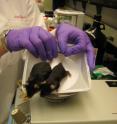Johns Hopkins researchers unravel clues to infertility among obese women
Obese women have a well-known risk for infertility, but a new Johns Hopkins Children's Center study has unraveled what investigators there believe is the mechanism that accounts for the risk. The research, conducted in mice and published online on Sept. 8 in the journal Cell Metabolism, shows that the pituitary gland actively responds to chronically high insulin levels, triggering a cascade of hormonal changes that disrupt ovarian function and impair fertility.
The findings challenge the widely held belief that infertility is a result of insulin resistance — a body's insensitivity to chronically elevated insulin levels and a hallmark of obesity — and suggest a new culprit: heightened sensitivity to insulin's effects on the pituitary gland.
"What we propose is a fundamentally new model showing that different tissues respond to obesity differently, and that while cells in the liver and muscle do become insulin resistant, cells in the pituitary remain sensitive to insulin," says principal investigator Andrew Wolfe, Ph.D., of Hopkins Children's.
Scientists traditionally have focused on treating infertility by lowering insulin levels as a way to treat insulin resistance. However, the new model suggests that decreasing the pituitary's sensitivity to insulin could be an important new target for treatment instead.
Insulin resistance, marked by persistently elevated insulin, abnormal regulation of blood sugar and insensitivity to insulin in the liver and muscle cells, occurs in type 2 diabetes, metabolic syndrome and polycystic ovary syndrome (PCOS). PCOS is the most common cause of infertility, affecting up to one in 10 women.
Because ovarian function and fertility are mostly regulated by the pituitary, the body's master gland, the Hopkins team set out to find out exactly how elevated insulin levels affect the pituitaries of obese women to render them infertile. The investigators focused on a class of pituitary cells called gonadotrophs, which secrete luteinizing hormone (LH), critical for ovulation and fertility. The researchers suspected that when awash with too much circulating insulin, the gonadotrophs of obese mice start pumping out large amounts of LH, thus disrupting ovulation.
To test their hypothesis, the scientists engineered mice with missing insulin receptors in their pituitary glands and compared them to mice with intact insulin receptors. After three months on a high-fat diet, the obese mice with intact insulin receptors developed all the classic symptoms of PCOS: elevated LH levels, high testosterone, irregular reproductive cycles and fewer ovulations. The mice with missing insulin receptors, however, maintained near-normal LH levels, regular cycles and normal ovulation despite their obesity.
To further clarify the effect of insulin on the pituitary, the researchers compared the gonadotrophs of obese mice to those of lean mice by injecting the animals with gonadotropin-releasing hormone (GnRH), which stimulates LH and is critical for ovulation and fertility. Lean mice, with and without pituitary insulin receptors, had normal elevations of LH. Obese mice with intact insulin receptors experienced increases of LH twice as high. Yet, the obese mice with missing insulin receptors in their pituitaries had near-normal LH elevations.
These results, the researchers say, show that the high levels of insulin seen in obesity make the pituitary more sensitive to GnRH and help initiate a hormonal chain-reaction that disrupts fertility.
To demonstrate insulin's direct effects on the pituitary, the scientists injected mice with insulin. Mice with intact insulin receptors, lean or obese, had mild LH elevations, while mice with deleted insulin receptors, lean or obese, experienced none.
To determine whether these hormonal differences would carry over into actual differences in fertility, the researchers allowed the mice to mate. The pregnancy outcomes mirrored the hormonal findings. Lean mice, with or without pituitary insulin receptors, had six times the number of successful pregnancies as obese mice. However, obese mice with missing pituitary insulin receptors had near-normal pregnancy outcomes, with five times more successful pregnancies than obese mice whose pituitary insulin receptors were intact.
By deleting the insulin receptors in the pituitary cells of mice, the researchers managed to restore normal LH levels, maintain ovulation and near-intact fertility even in obese mice with elevated insulin levels. Despite normal hormonal levels and ovulation, the obese mice with missing insulin receptors were not as fertile as lean mice with normal insulin levels. The finding suggests that since the ovaries share partial control of ovulation and fertility with the pituitary, they too may be affected by high insulin levels.
Source: Johns Hopkins Medical Institutions
Articles on the same topic
- A missing link from obesity to infertility foundTue, 7 Sep 2010, 16:36:46 UTC
Other sources
- A missing link from obesity to infertility: Researchers unravel clues to infertility among obese womenfrom Science DailyWed, 8 Sep 2010, 2:21:26 UTC
- A missing link from obesity to infertility foundfrom PhysorgTue, 7 Sep 2010, 16:35:23 UTC
